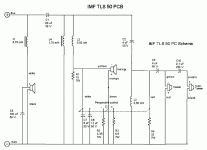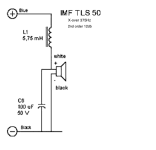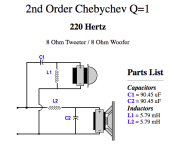< DId these vary a lot in T/S specs over the years? Vas, Fs, Qes and Qts are wildly different between all the linked references.
There were a number of different versions
SP1014, 1022 Utilised in the following systems: Cantor(1971), Chorale(1970), KEFKIT1(1974)
SP1039 Utilised in the following systems: 103(1976), 104(1973), 104aB(1976)
SP1047 (1974) Used in: KEFKIT 1(1974)
SP1054 1976 Used in: Calinda(1976)
SP1063 1976 Used in: Caprice(1977), Corelli(1976), C40(1979),
C65(1979)
SP1014 – constructors, small magnet, Chorale
SP1022 – Qts .41, large magnet, OK in 2cu.ft, 50ltr BR
SP1022 delights in stretching 1.8 cu ft (50 L) to 2.0 cu ft!
SP1039 – med. Q, large magnet 104, 104aB, Monitor Audio MA4, 103 Ref. Best
SP1054 – Qts .23
SP1063 – med. Q, small magnet
The SP1014 is the most common and should be the design goal. Don't know how much each version differed between samples....
There were a number of different versions
SP1014, 1022 Utilised in the following systems: Cantor(1971), Chorale(1970), KEFKIT1(1974)
SP1039 Utilised in the following systems: 103(1976), 104(1973), 104aB(1976)
SP1047 (1974) Used in: KEFKIT 1(1974)
SP1054 1976 Used in: Calinda(1976)
SP1063 1976 Used in: Caprice(1977), Corelli(1976), C40(1979),
C65(1979)
SP1014 – constructors, small magnet, Chorale
SP1022 – Qts .41, large magnet, OK in 2cu.ft, 50ltr BR
SP1022 delights in stretching 1.8 cu ft (50 L) to 2.0 cu ft!
SP1039 – med. Q, large magnet 104, 104aB, Monitor Audio MA4, 103 Ref. Best
SP1054 – Qts .23
SP1063 – med. Q, small magnet
The SP1014 is the most common and should be the design goal. Don't know how much each version differed between samples....
Box volume seems a complete crapshoot
Modern modeling on the original data does suggest that.
dave
Last edited:
There were a number of different versions
Many here: https://www.t-linespeakers.org/drivers/b200.html
dave
I also have a pair of B200 SP1014. Had them for years. A few months back I measured them to see if I could do anything interesting with them. I used my Clio with the known volume method.
Reults:
MANUFACTURER: KEF MODEL: B200 SP1014 driver 2
Fs 37.35 Hz Re 6.80 Ω Sd 232.0000 cm²
Qms 5.76 Qes 0.83 Qts 0.72
Cms 0.8357 mm/N Mms 21.7238 g Rms 0.88 Ωm
Bl 6.48 N/A dBspl 88.00 VAS 62.8081 L
Zmin 7.12 Ω L1kHz 0.63 mH L10kHz 0.33 mH
MANUFACTURER: KEF MODEL: B200 SP1014 driver 2
Fs 32.96 Hz Re 6.90 Ω Sd 232.0000 cm²
Qms 6.45 Qes 0.76 Qts 0.68
Cms 0.9787 mm/N Mms 23.8244 g Rms 0.76 Ωm
Bl 6.69 N/A dBspl 87.41 VAS 73.5605 L
Zmin 7.07 Ω L1kHz 0.67 mH L10kHz 0.32 mH
Before measuring I run the drivers @15hz full excurasion for about 48 hours. This actually dropped Fs about 6-7Hz and Ts from 0.8 to 0.7. So it seems that this is a necessary step for old drivers like these.
The values I got line up nicely with those that I downloaded from Sixmoons (long time ago, the page doen not exist anymore)
http://www.sixmoons.com/audioreview.../roadtour5.html* Manufacturer: KEF
Hope this is useful.
Erik
Reults:
MANUFACTURER: KEF MODEL: B200 SP1014 driver 2
Fs 37.35 Hz Re 6.80 Ω Sd 232.0000 cm²
Qms 5.76 Qes 0.83 Qts 0.72
Cms 0.8357 mm/N Mms 21.7238 g Rms 0.88 Ωm
Bl 6.48 N/A dBspl 88.00 VAS 62.8081 L
Zmin 7.12 Ω L1kHz 0.63 mH L10kHz 0.33 mH
MANUFACTURER: KEF MODEL: B200 SP1014 driver 2
Fs 32.96 Hz Re 6.90 Ω Sd 232.0000 cm²
Qms 6.45 Qes 0.76 Qts 0.68
Cms 0.9787 mm/N Mms 23.8244 g Rms 0.76 Ωm
Bl 6.69 N/A dBspl 87.41 VAS 73.5605 L
Zmin 7.07 Ω L1kHz 0.67 mH L10kHz 0.32 mH
Before measuring I run the drivers @15hz full excurasion for about 48 hours. This actually dropped Fs about 6-7Hz and Ts from 0.8 to 0.7. So it seems that this is a necessary step for old drivers like these.
The values I got line up nicely with those that I downloaded from Sixmoons (long time ago, the page doen not exist anymore)
http://www.sixmoons.com/audioreview.../roadtour5.html* Manufacturer: KEF
- Model: B200 SP1014
- Piston Diameter = 172.0 mm
- f(s)= 37.68 Hz
- R(e)= 7.52 Ohms
- Z(max)= 59.42 Ohms
- Q(ms)= 5.965
- Q(es)= 0.864
- Q(ts)= 0.755
- V(as)= 56.650 liters (2.001 cubic feet)
- L(e)= 1.20 mH
- n(0)= 0.33 %
- SPL= 87.34 1W/1m
- M(ms)= 23.89 grams
- C(ms)= 0.75 mm/N
- BL= 7.02
Hope this is useful.
Erik
Too little information. It would be nice to have polars for the tweeter in the designated waveguide as well as for the woofer, along with impedance information.
If that's not an option it may be simpler for you to adjust the existing crossover using quick measurements as you go.
If that's not an option it may be simpler for you to adjust the existing crossover using quick measurements as you go.
Happy new year!!Still nobody has attempted a crossover!!
The frd used for the simulation of the b200 is the one measured in Arta posted on the French website.
The baffle size I used for the simulation is the one you posted in the other thread. The cabinet volume is 25L (heavy fill).
Tweeter is the SB26adc (no waveguide of course).
Some lateral thinking while waiting for the opportunity to finish my enclosure (other pressing projects). What if the upper range was not covered by a conventional tweeter but by a full-range unit? I've been reading about these, for instance (there may be others too)....
Scanspeak 10F ---- 85db typical
Fostex FF85WK ---- 86.5db
Peerless TG9FD ---- 84db
Sensitivity would take a hit, but the B200 has a quoted sensitivity of 85db - seems low to me for an 8" but would match.
What would be the pros and cons of this versus a conventional tweeter? I also believe Planet10 might have some input here.
Scanspeak 10F ---- 85db typical
Fostex FF85WK ---- 86.5db
Peerless TG9FD ---- 84db
Sensitivity would take a hit, but the B200 has a quoted sensitivity of 85db - seems low to me for an 8" but would match.
What would be the pros and cons of this versus a conventional tweeter? I also believe Planet10 might have some input here.
What if the upper range was not covered by a conventional tweeter but by a full-range unit?
Exactly what i was thinking when i saw the title in my notices.
Ideally you want the woofer a bit more sensitive than th ewoofer and XO at or near baffle step.
Of the 3 mentioned i prefer the FF85wk but there are a few simple mods that that emeliroate the rough edges.
There are 2 Scans, a FR and a MR. The former is good, the later lacks any real top. The TG9 is a massive step up from the well known TC9, but not in the same league as the other 2.
Another consideration would be the Alpair 5.2/3 (or the bargin CHN-50 is not far behind for really cheap).
This is how i will end up using my B200s, if a separate cabinet i can play on the top.
dave
Last edited:
One cannot tell from the component values only: the driver SPL, Z and baffle size in question have to be taken into consideration. To be honest: I have never set eyes upon an acoustic Chebychev transfer function.
Just L1 and C6.Is it just L1 and C6 or do C1 and L4 come into it also? What about the rest - L3, R1 etc?
Theoretically, yes.does this look like a 2nd order Chebychev?
Hello shadowplay62, in post #27, the x-over, you mean the B200 SP1014? Thanks for an answer. Best regards, Uli from Germany.
@audiouli
Hi Uli, yes it is the sp2014 version. I traced the curve measured in Arta and published on the french site (link @ post #10). Unfortunately, I do not have the project anymore as i fotgot to backup some files in the last win 11 installation and I also lost my drivers database...
Tchuess
Hi Uli, yes it is the sp2014 version. I traced the curve measured in Arta and published on the french site (link @ post #10). Unfortunately, I do not have the project anymore as i fotgot to backup some files in the last win 11 installation and I also lost my drivers database...

Tchuess
Hi, i have the SBA-tweeters and will build your project just for fun. Is a hobby from me. Best regards, Uli.
That's great, but if you have the possibility you should carry out a set of measurements in the actual box.
Have fun and let us know how it develops.
Best regards, Saverio
Have fun and let us know how it develops.
Best regards, Saverio
- Home
- Loudspeakers
- Multi-Way
- KEF B200 in 2-way with lower x-over - 1.5K to 2K


